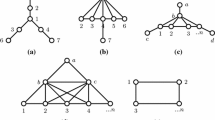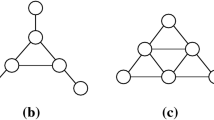Abstract
The NP-hard Independent Set problem is to determine for a given graph G and an integer k whether G contains a set of k pairwise non-adjacent vertices. The problem has numerous applications in scheduling, including resource allocation and steel manufacturing. There, one encounters restricted graph classes such as 2-union graphs, which are edge-wise unions of two interval graphs on the same vertex set, or strip graphs, where additionally one of the two interval graphs is a disjoint union of cliques.
We prove NP-hardness of Independent Set on a very restricted subclass of 2-union graphs and identify natural parameterizations to chart the possibilities and limitations of effective polynomial-time preprocessing (kernelization) and fixed-parameter algorithms. Our algorithms benefit from novel formulations of the computational problems in terms of (list-)colored interval graphs.
Access this chapter
Tax calculation will be finalised at checkout
Purchases are for personal use only
Preview
Unable to display preview. Download preview PDF.
Similar content being viewed by others
References
Bafna, V., Narayanan, B.O., Ravi, R.: Nonoverlapping local alignments (weighted independent sets of axis-parallel rectangles). Discrete Appl. Math. 71(1-3), 41–53 (1996)
Bar-Yehuda, R., Halldórsson, M.M., Naor, J., Shachnai, H., Shapira, I.: Scheduling split intervals. SIAM J. Comput. 36(1), 1–15 (2006)
Bodlaender, H.L., Jansen, B.M.P., Kratsch, S.: Cross-composition: A new technique for kernelization lower bounds. In: Proc. 28th STACS. LIPIcs, vol. 9, pp. 165–176. Schloss Dagstuhl–Leibniz-Zentrum für Informatik (2011)
Booth, K.S., Lueker, G.S.: Testing for the consecutive ones property, interval graphs, and graph planarity using PQ-tree algorithms. J. Comput. Syst. Sci. 13(3), 335–379 (1976)
Chuzhoy, J., Ostrovsky, R., Rabani, Y.: Approximation algorithms for the job interval selection problem and related scheduling problems. Math. Oper. Res. 31(4), 730–738 (2006)
Fellows, M.R., Hermelin, D., Rosamond, F.A., Vialette, S.: On the parameterized complexity of multiple-interval graph problems. Theor. Comput. Sci. 410(1), 53–61 (2009)
Fulkerson, D.R., Gross, O.A.: Incidence matrices and interval graphs. Pacific J. Math. 15(3), 835–855 (1965)
Halldórsson, M.M., Karlsson, R.K.: Strip Graphs: Recognition and Scheduling. In: Fomin, F.V. (ed.) WG 2006. LNCS, vol. 4271, pp. 137–146. Springer, Heidelberg (2006)
Höhn, W., König, F.G., Möhring, R.H., Lübbecke, M.E.: Integrated sequencing and scheduling in coil coating. Manage. Sci. 57(4), 647–666 (2011)
Impagliazzo, R., Paturi, R., Zane, F.: Which problems have strongly exponential complexity? J. Comput. Syst. Sci. 63(4), 512–530 (2001)
Jansen, K.: Generalizations of assignments of tasks with interval times. Technical report, Universität Trier (1991)
Jansen, K.: Transfer flow graphs. Discrete Math. 115(1-3), 187–199 (1993)
Jiang, M.: On the parameterized complexity of some optimization problems related to multiple-interval graphs. Theor. Comput. Sci. 411, 4253–4262 (2010)
Kolen, A.W., Lenstra, J.K., Papadimitriou, C.H., Spieksma, F.C.R.: Interval scheduling: A survey. Nav. Res. Log. 54(5), 530–543 (2007)
Nakajima, K., Hakimi, S.L.: Complexity results for scheduling tasks with discrete starting times. J. Algorithms 3(4), 344–361 (1982)
Sbihi, N.: Algorithme de recherche d’un stable de cardinalite maximum dans un graphe sans etoile. Discrete Math. 29(1), 53–76 (1980)
Spieksma, F.C.R.: On the approximability of an interval scheduling problem. J. Sched. 2(5), 215–227 (1999)
Author information
Authors and Affiliations
Editor information
Editors and Affiliations
Rights and permissions
Copyright information
© 2012 Springer-Verlag Berlin Heidelberg
About this paper
Cite this paper
van Bevern, R., Mnich, M., Niedermeier, R., Weller, M. (2012). Interval Scheduling and Colorful Independent Sets. In: Chao, KM., Hsu, Ts., Lee, DT. (eds) Algorithms and Computation. ISAAC 2012. Lecture Notes in Computer Science, vol 7676. Springer, Berlin, Heidelberg. https://doi.org/10.1007/978-3-642-35261-4_28
Download citation
DOI: https://doi.org/10.1007/978-3-642-35261-4_28
Publisher Name: Springer, Berlin, Heidelberg
Print ISBN: 978-3-642-35260-7
Online ISBN: 978-3-642-35261-4
eBook Packages: Computer ScienceComputer Science (R0)




